Sphynx is originated from Canada but Viverral is originated from United States. Both Sphynx and Viverral are of same weight. Both Sphynx and Viverral has almost same life span. Both Sphynx and Viverral has same litter size. Sphynx requires Moderate Maintenance. But Viverral requires Low Maintenance
Basic Information
undefined
Canada
United States
Life Span:
8 - 14 Years
10 - 15 Years
Colors Available:
All colors
Cream, black, tan - spots
Coat:
Hairless
Short and plush
Temperament:
Alert, Cheerful, Curious, Energetic, Friendly, Gentle, Intelligent, Lively, Loving, Loyal, Outgoing, Playful, Quiet, Responsive, Social, Territorial
Affectionate, Aggressive, Alert, Cheerful, Curious, Energetic, Friendly, Independent, Intelligent, Lively, Loving, Loyal, Outgoing, Playful, Responsive, Social, Stubborn, Territorial
Grooming:
Moderate Maintenance
Low Maintenance
New Owners Friendly:
Yes
Yes
History
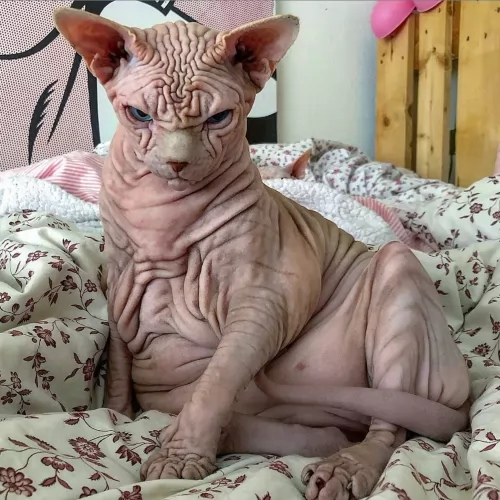 The Sphynx cat is well known for its hairlessness. This breed started its development in Toronto, Canada.
The Sphynx cat is well known for its hairlessness. This breed started its development in Toronto, Canada.
A hairless kitten was born and it was mated to produce more hairless kittens. These kittens were called Canadian Hairless Cats. They were used as the foundation for a new breed.
In the 1970s, more hairless kittens were born and placed into the Sphynx breeding program. They were mated with Devon Rex cats. The International Cat Association recognizes this cat breed.
This is a rare cat breed and therefore not much information on it is available.
It does seem that in 2002, a 5th generation Viverral was developed and this established the breed.
The cat is described as a fishing cat hybrid. A breeding program was started but it is thought that the cat became extinct.
Description
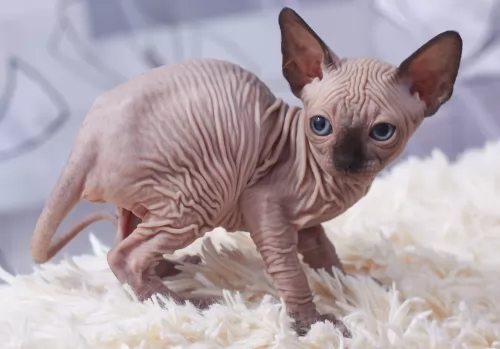 The Sphynx is a medium-sized, fine-boned, muscular cat that weighs roughly between 3.5 – 7 kg. The skin of the cat has a soft chamois type feel to it.
The Sphynx is a medium-sized, fine-boned, muscular cat that weighs roughly between 3.5 – 7 kg. The skin of the cat has a soft chamois type feel to it.
Sometimes there can be a few hairs. The head of this cat is longer and narrower than many of the other cat breeds. The ears are large.
This cat is going to need a bath once a week with special medicated cat shampoo. The cat also has no whiskers or eyelashes. The legs are long and slender and he has a barrel chest. All skin patterns and colors are available with the cat.
Temperament:
The Sphynx is a loving, friendly, energetic, extrovert cat that loves nothing more than to be petted and pampered.
It one of the few dependent cats there are. Even though he is social, he isn’t very vocal. They are playful too and because they are also intelligent, they will need stimulating games and toys to keep them from becoming bored.
They get on well with children in the home. Like many other cats, the Sphynx cat can be doglike and they like to welcome their owners home.
The Viverral is muscular and substantial. He has a smallish head and smallish ears with a thick tail.
The coat is spotted. The base color of the coat and the spots should be different. The light cream underbelly is also spotted.
Large, muscular, and solid, the cat’s eyes are big and round in the smallish heald. The coat is short and plush with a spotted pattern of black, brown or tan spots.
Temperament:
The Viverral cat has been designed to produce friendly kittens that are curious and confident. They turn out strong and confident and are suitable as house cats.
New cat owners might have success with them and they can even be friendly with children in the home, but the truth remains, they are unpredictable.
Beautiful and something unique, it is not likely though that this cat breed would have wanted to be cuddled and petted by his human owners.
Characteristics
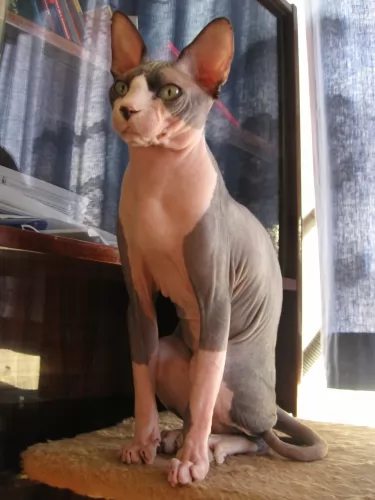 The Sphynx can be in a house where there are children who have been taught to be kind and gentle with animals.
The Sphynx can be in a house where there are children who have been taught to be kind and gentle with animals.
The cat is energetic and loves to entertain and amuse his human family with his antics.
He is loving and loyal to his human family and absolutely hates staying on his own. He can actually get depressed when he is left on his own often.
He would be far better off with another cat companion. If you're looking for a fun, playul, loving and affectionate feline companion, you need look no further than the weird-looking sphynx cat.
Hybrid cats such as the Viverral can look quite a bit like a wild cat and this is what first appeals to cat lovers. They want an exotic cat to brag about.
However, these cats can come up with a whole lot of behavioral problems so that you wish you had never got one. One should just go along to some of the many cat shelters there are to discover how many hybrid cats land up there.
They turned out to be a disappointment – their behavior wouldn’t conform to what their human family expected of them. This is the story of hybrid cats. Humans want some exotic looking animal to please their greedy natures and then when the cats don’t behave the way they should, they get rid of them. Rather, it is humans that need to change their behavior and leave wild animals alone.
The Viverral can have their good side and be splendid pets but they aren’t consistent. They have a streak of unpredictability, and they also have issues with the use of a litter box.
They mark their territory too and can show some aggression. Any animal with a wild side isn’t going to make the best pet, but still, some cat lovers have managed to bring out their best side.
Health Problems
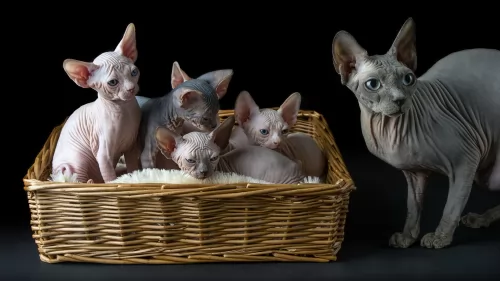 The Canadian Sphynx, just because of its lack of hair, already faces challenges. Other cats have fur to keep them warm and to protect the skin from sunlight.
The Canadian Sphynx, just because of its lack of hair, already faces challenges. Other cats have fur to keep them warm and to protect the skin from sunlight.
In fact, when the kittens are born, without hair, they are vulnerable and become prone to respiratory infections. Reputable breeders, therefore, only allow their kittens to go to new homes when they are at least 14 weeks of age.
This cat is also prone to skin problems and this could include rashes and fungal infections. As with any other cat, the Sphynx cat requires protection from harmful cat diseases by being vaccinated.
The development of hybrid cats began as a scientific effort in the 1970s. Hybrid pets can be aggressive and also solitary.
Hybrid cats are an unnatural breeding. They are cat species that weren’t meant to mate in the first place. Breeders tell stories of premature births and also aborted pregnancies.
Some of the more common illnesses among hybrid cats include digestive issues. Also, vaccinations used to protect our domestic cats from disease have not been approved for use in hybrid animals.
A hybrid cat has a wild side to him. These cats were bred to look like a wild cat, and although they are healthy, they can also have some health issues.
Ensuring the cat has a proper diet will contribute more to better health. As mentioned, some of these cats can battle with the likes of chronic diarrhea and irritable bowel disease and also battle with intestinal parasite issues.
Caring The Pet
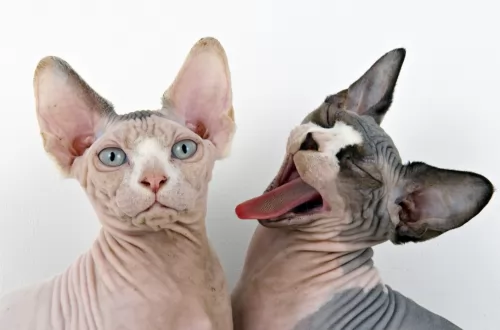 Even though the Sphynx cat is hairless, he isn’t to be regarded as a low maintenance cat. First of all, the sheer lack of hair means he is more vulnerable to the sun and to the cold. If he goes outdoors, you have to be careful that his skin doesn’t get burned.
Even though the Sphynx cat is hairless, he isn’t to be regarded as a low maintenance cat. First of all, the sheer lack of hair means he is more vulnerable to the sun and to the cold. If he goes outdoors, you have to be careful that his skin doesn’t get burned.
These cats also have more ear wax than other cats as they don’t have hair in their ears. Dirt, wax, and oils can accumulate in the ears. They will need to be cleaned regularly, and a vet or the pet groomer can help you with this.
The Sphynx cat also collects oil and dirt under their nails, so just like the ears, the nails as well as the surrounding skin folds will need to be properly cleaned. Cat owners need to know that these hairless cats aren't as low maintenance as thought, but require quite a bit of grooming. Special grooming products are available for this cat.
What one cat likes to eat won’t be the same as another cat. The Sphynx, like every other cat, is a carnivore and he will need all the different nutrients from his food.
The best commercial cat food manufacturers know that the proportion of these nutrients will vary as the cat ages and goes through different stages of its life. Your cat needs the right meat foods and he needs the right quantity as well.
These are different cats to your regular domestic cat, and they will require different care. One of the things you need to do for a cat like this is provide it with an outdoor enclosure.
Because of their wild side, they are longing to be outdoors and you may find it difficult integrating such a cat into your home.
The Viverral needs plenty of exercise but you can’t just let them roam freely outdoors. Yes, you can train them to walk with a leash but you need to allow him outside in the enclosure. You can include a shallow paddling pool for him too.
These are active, intelligent cats and you will need to invest in some interactive toys for him to keep him amused.
You will need to supply this cat with a scratching post and a climbing tree. This is because as a cat, he is a natural climber and scratcher and he will need these in his life.
Ensure your feline pet has a nice warm, dry place to sleep.
Comparison with other breeds
- Viverral vs Abyssinian - Breed Comparison
- Viverral vs Aegean - Breed Comparison
- Viverral vs African Serval - Breed Comparison
- Viverral vs Chausie - Breed Comparison
- Viverral vs American Bobtail - Breed Comparison
- Viverral vs American Curl - Breed Comparison
- Viverral vs American Keuda - Breed Comparison
- Viverral vs American Longhair - Breed Comparison
- Viverral vs American Polydactyl - Breed Comparison
- Viverral vs American Shorthair - Breed Comparison
- Viverral vs American Wirehair - Breed Comparison
- Viverral vs Applehead Siamese - Breed Comparison
- Viverral vs Ashera - Breed Comparison
- Viverral vs Asian - Breed Comparison
- Viverral vs Asian Semi-Longhair - Breed Comparison
- Viverral vs Australian Mist - Breed Comparison
- Viverral vs Balinese - Breed Comparison
- Viverral vs Bengal - Breed Comparison
- Viverral vs Bicolor - Breed Comparison
- Viverral vs Birman - Breed Comparison
- Viverral vs Blue Russian - Breed Comparison
- Viverral vs Bombay - Breed Comparison
- Viverral vs Brazilian Shorthair - Breed Comparison
- Viverral vs Bristol - Breed Comparison
- Viverral vs British Longhair - Breed Comparison
- Sphynx vs Abyssinian - Breed Comparison
- Sphynx vs Aegean - Breed Comparison
- Sphynx vs African Serval - Breed Comparison
- Sphynx vs Chausie - Breed Comparison
- Sphynx vs American Bobtail - Breed Comparison
- Sphynx vs American Curl - Breed Comparison
- Sphynx vs American Keuda - Breed Comparison
- Sphynx vs American Longhair - Breed Comparison
- Sphynx vs American Polydactyl - Breed Comparison
- Sphynx vs American Shorthair - Breed Comparison
- Sphynx vs American Wirehair - Breed Comparison
- Sphynx vs Applehead Siamese - Breed Comparison
- Sphynx vs Ashera - Breed Comparison
- Sphynx vs Asian - Breed Comparison
- Sphynx vs Asian Semi-Longhair - Breed Comparison
- Sphynx vs Australian Mist - Breed Comparison
- Sphynx vs Balinese - Breed Comparison
- Sphynx vs Bengal - Breed Comparison
- Sphynx vs Bicolor - Breed Comparison
- Sphynx vs Birman - Breed Comparison
- Sphynx vs Blue Russian - Breed Comparison
- Sphynx vs Bombay - Breed Comparison
- Sphynx vs Brazilian Shorthair - Breed Comparison
- Sphynx vs Bristol - Breed Comparison
- Sphynx vs British Longhair - Breed Comparison
 Petzlover
Petzlover The Sphynx cat is well known for its hairlessness. This breed started its development in Toronto, Canada.
The Sphynx cat is well known for its hairlessness. This breed started its development in Toronto, Canada. The Sphynx is a medium-sized, fine-boned, muscular cat that weighs roughly between 3.5 – 7 kg. The skin of the cat has a soft chamois type feel to it.
The Sphynx is a medium-sized, fine-boned, muscular cat that weighs roughly between 3.5 – 7 kg. The skin of the cat has a soft chamois type feel to it. The Sphynx can be in a house where there are children who have been taught to be kind and gentle with animals.
The Sphynx can be in a house where there are children who have been taught to be kind and gentle with animals. The Canadian Sphynx, just because of its lack of hair, already faces challenges. Other cats have fur to keep them warm and to protect the skin from sunlight.
The Canadian Sphynx, just because of its lack of hair, already faces challenges. Other cats have fur to keep them warm and to protect the skin from sunlight. Even though the Sphynx cat is hairless, he isn’t to be regarded as a low maintenance cat. First of all, the sheer lack of hair means he is more vulnerable to the sun and to the cold. If he goes outdoors, you have to be careful that his skin doesn’t get burned.
Even though the Sphynx cat is hairless, he isn’t to be regarded as a low maintenance cat. First of all, the sheer lack of hair means he is more vulnerable to the sun and to the cold. If he goes outdoors, you have to be careful that his skin doesn’t get burned.